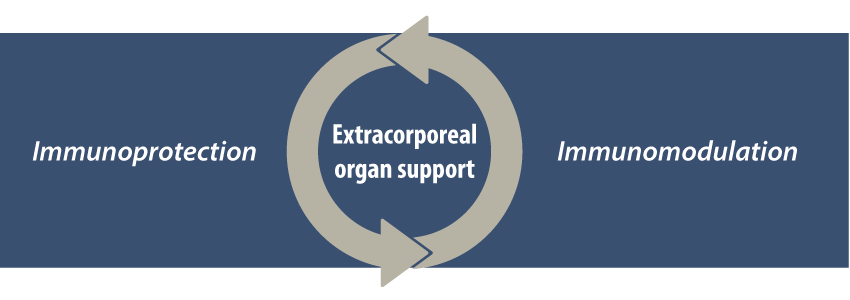Immunoprotection | Immunomodulation | Adsorption
Currently available data on hospitalized SARS-CoV-2 positive patients show that some comorbidities such as diabetes mellitus, hypertension, cardiovascular disease and old age represent risk factors for a more severe course and need for hospitalization in intensive care. The uremic patient, acute or chronic, who needs hemodialysis treatment is intrinsically a fragile patient suffering from an immunodeficiency-compromise that potentially adds to the risk factors in case of SARS-CoV-2 infection.
It is rational to consider a hemodialysis strategy that is effective as renal support treatment while at the same time providing immunoprotection and immunomodulation through the removal of inflammatory mediators generated by immune cells involved in the advancement of severe forms of Acute Respiratory Failure (ARF) caused by the development of interstitial pneumonia and/or Acute Respiratory Distress Syndrome (ARDS), as is often the case of the COVID-19 patient.
PMMA hemodialysis devices, both for intermittent and continuous dialysis, are known for their unique biocompatibility due primarily to the non-activation of the complement system during contact between the blood compartment and the artificial material.
Furthermore, the adsorption capacity, in addition to the mechanisms of diffusion and convection, allows the removal of medium to high molecular weight molecules not removable by filtration, among which inflammation mediators IL-6, IL-8 and HMGB-1 whose levels are particularly increased in the development of severe acute respiratory failure (ARF).
In patients who have developed severe multi-organ failure, who are hospitalized in intensive care, and who are not responsive to standard therapy, a further proposal for extracorporeal treatment based on adsorption may be Polymyxin B Hemoperfusion.
The known action of Polymyxin B Hemoperfusion is to neutralize circulating endotoxin, free or bound to monocytes. This is rational as the first data in literature show the possibility of enteric symptomatology in COVID-19 patients and the ‘gut-lung’ interactions due to bacterial transmigrations and/or their components caused by changes in the intestinal membrane is well known.
In addition, Polymyxin B Hemoperfusion could be an aid in the management of patients with ARF and/or ARDS in COVID-19 patients due to the direct adsorption of activated cells (monocytes, neutrophils, lymphocytes) and the consequent reduction of inflammatory mediators such as IL-6, HMGB-1, PAI-1 and others.
